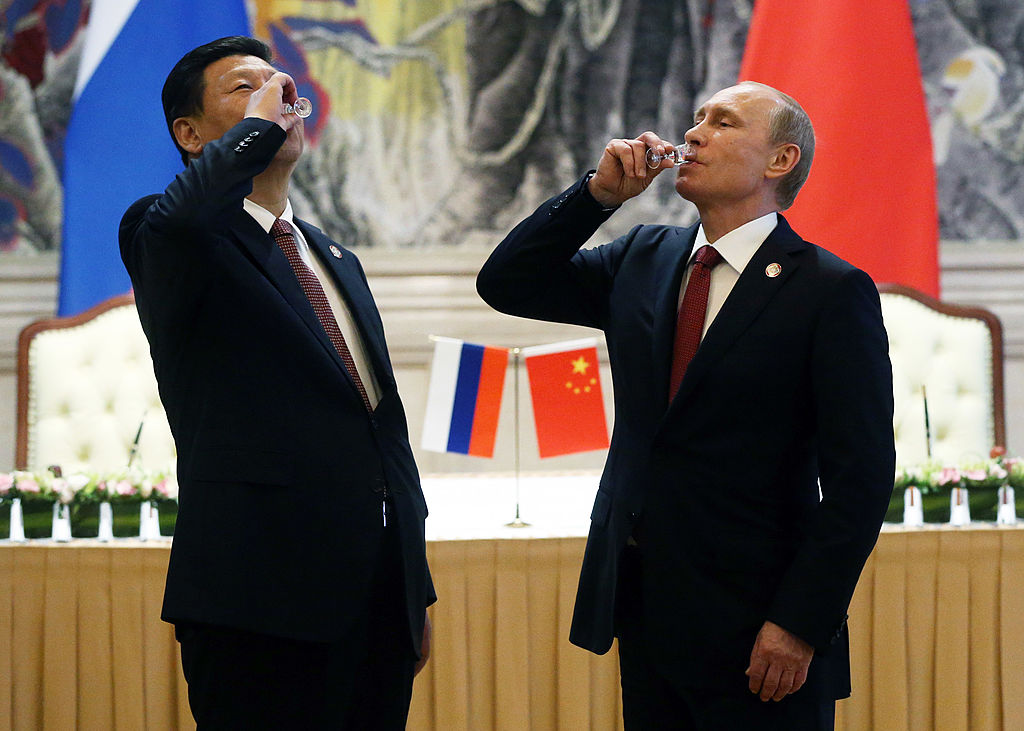
The year 2014 was just as significant as 1914. Russia’s annexation of the Crimean peninsula elicited a weak response from the West and highlighted a larger strategic problem: the erosion of the liberal-democratic world order. The West failed to rise to the challenge of Russian resurgence and, since 2014, has all but shrugged at the notion that it must act to sustain the rules-based global order we created after World War II.
Paul Dibb’s recent ASPI report is an important addition to a rather limp debate on great-power warfare and the role of the Sino-Russian relationship in Australia’s strategic outlook. Dibb outlines the ways in which Russia and China are profiting from the West’s strategic disarray. He points to China in the South China Sea and Russia in Crimea as examples of coercion by Beijing and Moscow in their ‘natural sphere[s] of influence’.
These ventures are symptomatic of a bigger challenge than just Western (specifically, US) weakness. To our disadvantage, strategists in the West continue to focus on Russian and Chinese advances and obsess over tracking their parallels with the Cold War era.
But a more productive relationship between Russia and the West is possible, as history shows. Such a relationship will only ever be based on matters of mutual interest, so we shouldn’t hold our breath for a democratic Russia. Russia, for its part, hasn’t turned away from its traditional focus on Europe, and President Vladimir Putin’s ‘idea of Russian exceptionalism, of Russia’s unique Eurasian identity’ is not inherently anti-Western.
The Eurasian narrative in Russia predates soured Russia–West ties. Europe is vital to Russia’s energy industry as by far its largest export market for natural gas.
Dibb argues we should expect some (more) risk-taking behaviour from Putin’s Russia, noting ‘Russia might consider using military force in such places as Moldova and Kazakhstan’. While some grievances exist, both states are active participants of Russian-led collective security and economic blocs.
Kazakhstan is one of the six members of the ‘Eurasian NATO’—the Collective Security Treaty Organization. Any Russian aggression against Kazakhstan would be in contravention of Article 4 of the CSTO treaty that Moscow itself crafted. Putin has also applied valuable lessons learned from the EU experiment in forming the Eurasian Economic Union. Kazakhstan is a member of the EEU, and Moldova is seeking to integrate into the union and was the EEU’s first observer state. Moscow needs these institutions to work, so self-inflicted damage is unlikely.
This brings us to the question of whether a Russia–China military bloc will ‘inevitably affect the international security order, including by challenging the system of US-centred alliances in the Asia–Pacific and Europe’. Perhaps. But the international system is already shifting away from US-centred alliances without the help of an accord between Beijing and Moscow. In the West we have been complacent in protecting liberal democracy from wear and tear.
The argument that Russia and China are united in their disdain for the West is contestable. These authoritarian powers have actually benefited from the Western-led processes of globalisation and market liberalisation. Moscow and Beijing seek respect, notice and recognition from the West that they’re legitimate poles of power in a multipolar system.
Dibb’s argument that Russia and China are developing an ‘ever-closer friendship of convenience’ is apt. But there’s potential for a falling out. The relationship between Russia and China will be convenient until it is not. Dibb argues that Moscow and Beijing might take risks to ‘regain lost territories’. What, then, of the possibility that China will seek to regain lost territory in the Russian far east?
A final problematic assumption is that the West is still united as a bloc and that the very concept is still of use. The notion of ‘the West versus the rest’ is fitting for historical black-and-white assessments of the international environment. However, the contemporary landscape is not so neatly divided. The use of ‘grey zone’ tactics means a new framework for pondering our security outlook is needed.
And while it’s true that US dominance and power-projection capacities are in relative decline, both Moscow and Beijing harbour long-term fragilities at home. Demographically, they’re both in serious trouble. China will likely get old before it gets rich, and therefore its time at the ‘top’ strategically might be relatively short lived. Russia has similar population challenges, magnified by an increasing brain drain of migration out of the country.
The established international system is eroding and the risk of conflict may have increased. However, we must be careful not to miss the forest for the trees. Russia–China ties are closer than ever before and, yes, we should expect the two states to take advantage of the West’s strategic and ideological disarray.
But our response will be short sighted if it focuses on Russia and China alone, for Putin and his Chinese counterpart Xi Jinping personify the profound transformation towards a multipolar order. There’s still time to reserve a seat at the leadership table for Western liberal democracy in this future international system.

